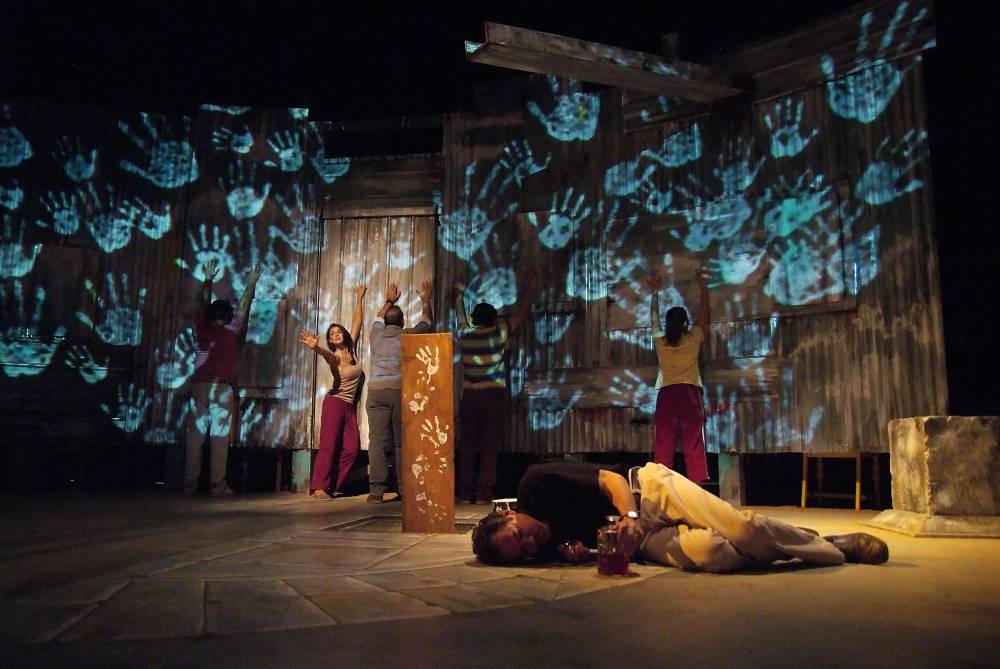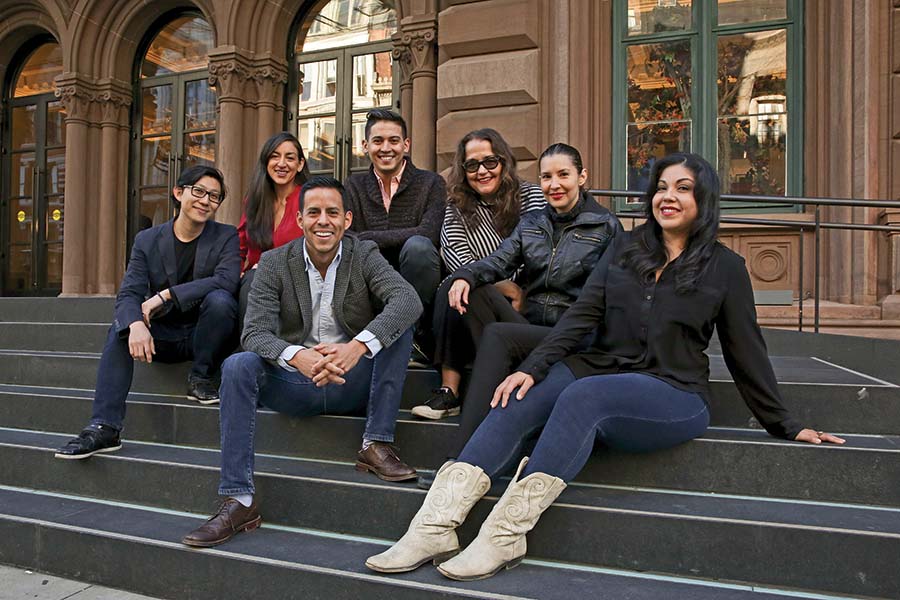You can’t really argue that the extraordinary size and growth of the Hispanic and Latinx population in the U.S. is invisible in our national discourse, even if much of that conversation—especially in the political arena—is often ugly, distorted beyond recognition. But if you took all your cues from popular culture or the arts, including theatre, you might not even know that this population is well over 17 percent in the U.S., given how little Latinx characters and stories are represented onstage or on-screen.
This lack of positive visibility was a key point of discussion at a 2013 convening hosted by the Latina/o Theatre Commons, where more than 70 Latinx theatremakers gathered. One attendee was producer Jacob Padrón.
“I grew up near El Teatro Campesino, and to see what it is to be in service of the community and to use theatre as a catalyst for change was something instilled in me from very young,” explained Padrón. Reinspired by the LTC convening, Padrón founded the Sol Project with the help of six other, in collaboration with HowlRound and the Latina/o Theatre Commons. It’s an initiative designed to take new works by Latinx playwrights and amplify them nationwide.
“The mission of Sol is to lift up our writers and provide more visibility, creating a new body of work that we can contribute to the American theatre,” explained Padrón, who for the last three years has been a producer at the Public Theater in New York City, but recently transitioned to focusing on the Sol Project full-time as its artistic director. “Because our society and cultures are in dialogue with the mainstream, our Latino writers should be in dialogue with all the great writers.”
The concept is simple: Over the next six years, 12 Latinx playwrights will receive productions at Off-Broadway theatres, as well as productions at two to three resident theatres outside New York. It’s a model that’s somewhere between the playwright-driven 13P and the rolling world premieres of the National New Play Network.
“I think there are writers who do have a strong enough voice to be considered in the American canon today—it’s just not being supported,” said Sol Project co-artistic producer Claudia Acosta. “We want to build a legacy comparable to Tennessee Williams, Sam Shepard, Sarah Ruhl. We want names that are recognized, works that are studied and produced all over the country.” The project’s other founders are directors Elena Araoz, David Mendizábal, and Laurie Woolery, actor Adriana Gaviria, and playwright Kyoung Park.
The project’s first play is under way, with the world premiere of Alligator by Hilary Bettis at New Georges in NYC, Nov. 27-Dec. 18. Bettis was already on New Georges’s radar, and the company’s artistic director, Susan Bernfield, had held a reading of the play. What the Sol Project provided, she noted, was an extra nudge. “Many times we have an interest in doing a play but never get that push to produce it,” Bernfield said.
Alligator is a Florida-set play that deals with what playwright Bettis refers to as “the quintessential American question”: What is my identity? The child of a Mexican mother and a white Methodist minister father, Bettis grew up in rural Minnesota where her family was the only mixed-heritage family, leading to an identity that straddles two worlds. “White people tell you you’re not white and Latino communities tell you you’re not Latino,” Bettis explained.
Identity is also at the center of the second Sol Project production, the New York premiere of Martín Zimmerman’s Seven Spots on the Sun, to play at Rattlestick Playwrights Theater, April 26-June 4, 2017. The 10 other Sol Project plays will be announced at a later date. And while many of the participating Off-Broadway theatres have been announced—including the Public, Atlantic Theater Company, Labyrinth Theater Company, and Women’s Project Theater—the list of playwrights isn’t locked down.
“We are doing everything we can to make the curatorial process as inclusive as possible,” said Padrón, noting that the effort is aiming to support writers at various stages of their career. “We’re working with agents, artistic directors, literary managers, and advocates of the initiative to find writers, and of course the larger Latinx theatre community,” he said.
Though the Sol Project does not have a formal submission policy, Padrón said, “We’re open to reading anyone’s work and learning more about anyone who is suggested to us.”
Alligator’s director is Sol Project cofounder Elena Araoz, who hopes that all 12 plays, taken together, will paint a portrait of a community that is vast and not easy to categorize. “My goal is to understand, what is the breadth in diversity in Latino stories?” she said. “Do you have to be an immigrant? Do you have to be the child of immigrants? Do you have to speak Spanish? Do you have to speak Spanish with a certain dialect? Do you have to be a certain shade? Can you be mixed race?”
These questions are also being asked outside and inside of the community. “One of the reasons it’s been so hard to coalesce a community of Latino artists is because Latino artists don’t even agree on who is Latino,” Araoz continued. “We have a new definition in the U.S.—our culture is changing, and we need to keep redefining it.”

But the point of the Sol Project isn’t just to get Latinx artists working but to attract new audiences as well. “The hope right now is to produce the works of our writers, and to reach as many audiences as possible so younger people see a representation of themselves,” said Padrón. “It’s important we have as many regional productions as possible, so that a young person sees that story that reflects their family, or actors who look like them.”
Finding and serving a new audience requires some stretching all around. Said Rattlestick artistic director Daniella Topol, “I want to make sure we have bilingual marketing material. I want to see if we have actors in the production we can bring to community centers. How can we really get this initiative out there in a way that impacts audiences in all the boroughs?”
The plays may also inspire a new generation of Latinx theatremakers. David Mendizábal, a director and a Sol Project cofounder, was trained in an almost entirely white theatrical canon, which made him feel like an outsider. The Sol Project, he said, has “helped me to find myself, to find my voice, to bring together all these pieces of myself that I fragmented because I didn’t see them,” he said. Now he identifies himself as an “artist of color.”
Indeed the Sol Project isn’t just a playwrights’ initiative. One of its principles is to ensure that people of color work at all levels of production; in fact, the entire creative team of Alligator is made up of artists of color.
“We can, and we must, do everything we can to open doors for each other, and create highly visible opportunities so the work of artists of color can be seen far and wide,” Padrón maintained.
Thanks to lead gifts from the Time Warner Foundation and Lin-Manuel Miranda, the Sol Project has raised $75,000 to put toward their first show, as well as securing $25,000 for operating support. In addition to all partner companies agreeing to produce a play by a Latinx playwright, each will commission another Latinx writer for a possible future staging; each of these commissioned writers will receive $15,000 plus development support.
“The idea behind this is that we want to plant seeds at each partner company to ensure that Latino/a theatre becomes a part of the ongoing work they produce,” explained Padrón.
While the Sol Project hasn’t yet announced its resident partners, as with NNPN, the rolling production model aims to take some pressure off of playwrights to get it right the first time. Said Bettis, “I feel we can create some really big things that we couldn’t do if this was the only shot we’d get.”
Getting a real shot is what the Sol Project is all about. Most Sol founders grew up seeing theatre as a “plan B”—a hobby to be pursued alongside a more secure career. “My parents saw film and TV and didn’t see our stories,” explained Mendizábal. “Sol inspired in me the ability to show them that all I learned growing up—this is what it’s for. Enough with the plan B conversation. It’s time to see us.”
Jose Solís, a Honduran writer based in New York City, is the chief theatre critic on StageBuddy.com, and a member of Drama Desk and the American Theatre Critics Association.
*A previous version of this article erroneously reported Jacob Padrón’s job at the Sol Project as co-artistic director; he’s actually the artistic director. And playwright Kyoung Park was not listed as a project founder; we have amended this article to include him.


